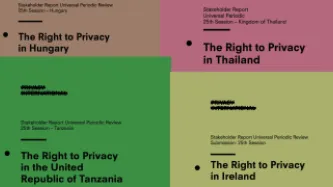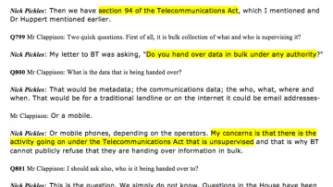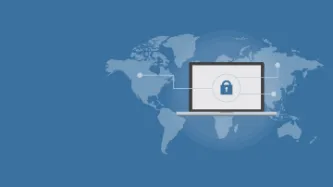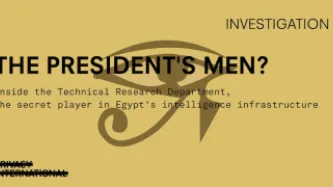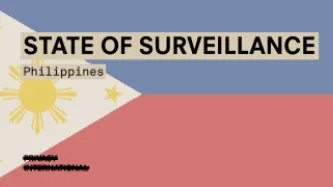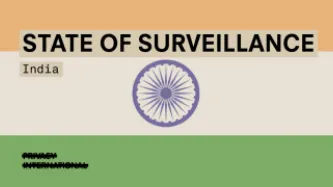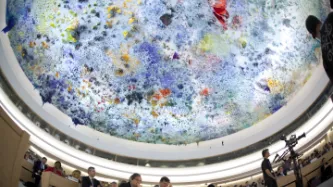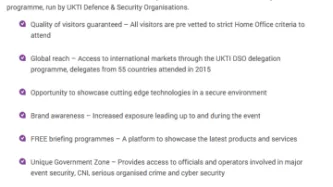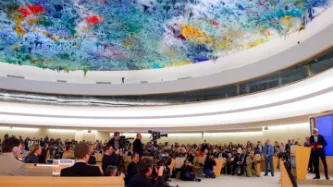Search
Content type: Press release
Harmit Kambo, Campaigns Director, Privacy International said
"The overwhelming vote by MPs last night in favour of massively intrusive new state surveillance powers represents both a failure of the democratic process and a grim watershed moment for the privacy of every one of us.
Over the course of the Bill Committee stage, Privacy International, alongside experts from academia, technology firms, the legal profession, human rights organisations, and civil liberties groups have proposed over…
Content type: Press release
Privacy International releases previously confidential correspondence between lawyers for MI5 and GCHQ and the former Interception of Communications Commissioner, highlighting problems with the relationship between the two bodies
The correspondences show a lack of meaningful oversight and restraint of UK surveillance agencies
Ahead of the vital commons vote on the Investigatory Powers Bill, we need to create a system that guarantees better oversight of surveillance powers…
Content type: Press release
Despite Government attempts to stop 650 claims about surveillance being investigated, the Investigatory Powers Tribunal has today ruled that the cases can be heard
However, the Tribunal is requiring the 650 claimants to submit further information demonstrating that they are "potentially at risk" of unlawful surveillance, prior to investigating their claims of unlawful spying
The Tribunal has said that people outside the UK have no legal right to find out if British…
Content type: News & Analysis
This letter originally appeared here.
Dear Home Secretary
You are fortunate that the SNP and Labour Party courageously abstained from the vote on the Investigatory Powers Bill, content with government assurances that mass surveillance of British citizens is not government policy. Mass surveillance is not, and could never be, government policy. Merely government practice.
I congratulate you on your much-quoted claim that the Investigatory Powers Bill will contain a “world-leading…
Content type: Press release
Privacy International, the leading global privacy rights NGO, has today filed a Judicial Review at the UK High Court, challenging the Investigatory Powers Tribunal's (IPT) decision that the Government can issue general hacking warrants. This decision means that British intelligence agency GCHQ can continue to hack into the computers and phones of broad classes of people - including those residing in the UK. The Investigatory Powers Bill, currently being debated in Parliament, seeks to…
Content type: News & Analysis
“It’s like 10,000 spoons when all you need is a knife”. Alanis Morissette thought that was ironic. I never thought so. I suggest a far more ironic lyric to you Alanis - "It’s like the Home Office not listening during a consultation about how it wants to listen to everything you do’. OK, it might not be the catchiest lyric, but you can’t say it’s not ironic.
Today the latest version of the Investigatory Powers Bill was published. The Government might want some credit…
Content type: News & Analysis
Over the next two weeks, the 25th session of the Universal Period Review Working Group will take place in Geneva. The Universal Period Review is a key mechanism of the UN Human Rights Council to remind UN Member States of their responsibility to respect and implement all human rights and fundamental freedoms.
Amongst others, Hungary, the United Republic of Tanzania, Thailand, and Ireland will be reviewed. Privacy International, in collaboration with national civil society…
Content type: Long Read
1984: A broad law, a broad power and a whole lot of secrecy
In the wake of litigation brought by Privacy International (‘PI’) and as the Government prepared to introduce the Draft Investigatory Powers Bill (‘IP Bill’) in November 2015, there was a cascade of ‘avowals’- admissions that the intelligence agencies carry out some highly intrusive surveillance operations under powers contained in outdated and confusing legislation.
It is disappointing that it has been almost six months since…
Content type: News & Analysis
This guest piece was written by Jane Duncan of the Right2Know Campaign. It does not necessarily reflect the views or position of Privacy International.
On 23rd March the United Nations Human Rights Committee released its assessment on South Africa’s compliance with the International Covenant on Civil and Political Rights (ICCPR). The report includes a blistering attack on the Government for failing to respect the privacy of the communications of users and makes…
Content type: Long Read
Written by: Maria del Pilar Saenz
With a raft of recent scandals involving proven and possible abuses of surveillance systems by state institutions, there is a clear need to generate policy and practice in Colombia that promotes respect for human rights. It is necessary to keep this in mind as an emerging public policy discussion on cybersecurity led by CONPES (The National Council for Economic and Social Policy) begins in Colombia. This series of reforms will serve as the policy basis…
Content type: Press release
The committee of data protection regulators across Europe, the Working Party 29, announced today its opinion on the current “Privacy Shield”. The Opinion is expected shortly, and based on the statements made by the Working Party chair in a press conference, we understand that the Working Party, while noting improvements from the annulled “Safe Harbor” agreement, has serious concerns about a range of aspects of the current "Privacy Shield" agreement with the U.S.
Overall they note the…
Content type: News & Analysis
Image source
This is a guest post by Zoë Blackler.
If you want to know how the UK came to be the most watched nation in the world, with CCTV on every corner, you need to go back to 1942: the now ubiquitous policing aid was first developed for use in missile testing by the German military.
Tear gas, GPS trackers, pain rays, and surveillance drones - technologies developed by the military for use against foreign enemies have a habit of finding their way into the hands…
Content type: Press release
Tomorrow, Privacy International and Open Rights Group will argue that wholesale and indiscriminate retention of our personal data is not permissible. The case, brought by MPs Tom Watson and David Davis against the Data Retention and Investigatory Powers Act 2014 (DRIPA), and in which PI intervened, will be heard in the European Court of Justice (CJEU) on 12 April. It has the potential to send shockwaves through the Investigatory Powers Bill, the controversial…
Content type: News & Analysis
Should the European Union agree to legitimise trade with a country that refuses to adhere to European legal standards? This is the fundamental question that will be addressed at tomorrow’s meeting among European privacy regulators when they publish their opinion on the data-sharing agreement known as the ‘Privacy Shield’, the replacement to the failed ‘Safe Harbour’ agreement.
Background
Many of the world’s largest companies, such as Google and Facebook, store their customers’ data in…
Content type: News & Analysis
PI's full analysis can be read here
On 29 February 2016, the European Commission and the US government released the details of the proposed EU-U.S. “Privacy Shield”. The “Privacy Shield” replaces the now defunct so-called “Safe Harbor”.
The Privacy Shield is in fact a significant number of documents from various parts of the U.S. administration, which merely outline the existing, weak U.S. safeguards applicable to personal data of EU citizens. These documents are…
Content type: Advocacy
Introduction
On 29 February 2016, the European Commission and the US government released the details of the proposed EU-U.S. “Privacy Shield”. The “Privacy Shield” replaces the now defunct so-called “Safe Harbor”.
The Privacy Shield is in fact a significant number of documents from various parts of the U.S. administration, which merely outline the existing, weak U.S. safeguards applicable to personal data of EU citizens. These documents are meant to serve as the basis for an “adequacy”…
Content type: News & Analysis
We already know that in some countries, like the UK, governments are drafting laws to legalise and legitimise their incredible surveillance powers. In the U.S. we are seeing legislation that is using remarkably similar language on encryption and surveillance. The next phase of the cryptowars has openly begun.
Yesterday what is being called the Feinstein-Burr decryption Bill was introduced into the US Senate and leaked online. Whilst the short title ‘Compliance with Court Orders…
Content type: News & Analysis
Hacking Team, an Italian surveillance company selling intrusive spyware to government authorities around the world, has had its global export license revoked by the Italian export authorities, according to a report in Il Fatto Quotidiano.
The move comes after intensive media scrutiny spurred by the hack of their internal systems last summer and revelations that they had sold surveillance technology to some of the world’s most authoritarian states.
One of the countries to which Hacking…
Content type: News & Analysis
We do agree with Ramon Fonseca about one thing: that “Each person has a right to privacy, whether they are a king or a beggar.”
But that’s where our commonality with co-founder of disgraced Panama law firm Mossack Fonseca ends.
Last year, a whistleblower leaked 11.5 million documents about the firm’s business brokering offshore companies, details of which were published yesterday. Reportedly the largest leak in journalistic history, the cache reveals hidden assets by a dozen current and…
Content type: News & Analysis
Following the launch of our report "The President’s Men?" shedding light on the existence of the Technical Research Department, a secret unit within the Egyptian intelligence infrastructure we publish here an open letter we have sent to President Abdel Fattah el-Sisi demanding that he responds to the extremely worrying situation we describe in the report.
Your Excellency President Abdel-Fattah El-Sisi,
On Wednesday 24th February we released a new investigation about the Technical…
Content type: Long Read
This guest piece was written by Jessamine Pacis of the Foundation for Media Alternatives. It does not necessarily reflect the views or position of Privacy International.
Introduction
With a history immersed in years of colonialism and tainted by martial law, Philippine society is no stranger to surveillance. Even now, tales of past regimes tracking their citizens’ every move find their way into people’s everyday conversations. This, for the most part, has kept Filipinos…
Content type: Long Read
Written by: Centre for Internet and Society
This guest piece was written by representatives of the Centre for Internet and Society (CIS). It does not necessarily reflect the views or position of Privacy International.
Introduction
As part of the State of the Surveillance project, CIS conducted a review of surveillance law, policy, projects, and trends in India. Below we provide a snap shot of key legal provisions governing surveillance in India and touch on…
Content type: Long Read
“This is my personal opinion,” concedes Branko, a taxi driver in Skopje, the Republic of Macedonia's capital. “It was done by America to stop Putin building his gas pipe line through Macedonia.”
“This is just politics,” he advises, skeptically.
It's a common reaction to the wiretapping scandal in Macedonia. Beginning in February last year when opposition leader Zoran Zaev posted a series of wiretaps online that he called 'bombs' – they seemingly showed that for years the phone calls of some…
Content type: Long Read
The recent back and forth between Apple and the FBI over security measures in place to prevent unauthorised access to data has highlighted the gulf in understanding of security between technologists and law enforcement. Modern debates around security do not just involve the state and the individual, the private sector plays a very real role too. There are worrying implications for the safety and security of our devices. Today, a new company stepped in to this discussion -- though it had been…
Content type: News & Analysis
This is a guest post by Jasna Koteska. Read Privacy International's full report documenting stories of mass surveillance in Macedonia here.
What are the main similarities and differences between modern surveillance methods in Macedonia and those of the socialist period?
In all 46 years of communist Macedonia, the total official number of personal communist surveillance files is 14,572. Unofficial sources report more than 50,000 files. The number of direct 'snitches' in communist…
Content type: News & Analysis
This article originally appeared in The Guardian's Comment Is Free section.
News of the legal dispute between Apple and the FBI has made headlines across the world. The dispute stems from the FBI’s investigation of the 2015 mass shooting in San Bernardino, California. As part of its investigation, the FBI obtained an iPhone used by one of the deceased shooters, Syed Farook. The data on the iPhone is encrypted and the FBI wants Apple to create new software that…
Content type: Press release
Today the Investigatory Powers Bill had its second reading in the House of Commons. Instead of listening to negative public response to the Bill, and evolving EU law precedent, the UK Government continues to fully advocate for the Bill's prompt passage through Parliament.
Privacy International Director of Campaigns, Harmit Kambo said:
"Today's second reading debate was a missed opportunity to put a brake on new surveillance powers that fundamentally shift the balance of power between…
Content type: Advocacy
Below is Privacy International’s oral statement to the Human Rights Council 31st ordinary session, 9 March 2016 Inter-active dialogue with the UN Special Rapporteur on the right to privacy. Privacy International's written statement is here.
BEGIN
Mr. President,
Privacy International welcomes the opportunity to participate in this first inter-active dialogue with the Special Rapporteur on the right to privacy. We regret however the Rapporteur’s late submission of his report.…
Content type: News & Analysis
Surveillance companies and government officials from across the world are gathering in the UK this week at the invitation of the Home Office for the UK’s “Premier Security and Law Enforcement Event’, one week after the controversial spying legislation, entitled the Investigatory Powers Bill, had its first reading in Parliament.
Delegates and companies will be attending the three-day long ‘Security and Policing’ trade show in Farnborough, the historical centre of the UK’s aerospace industry.…
Content type: Advocacy
In his first report to the UN Human Rights Council (the main UN human rights political body composed of 47 states from around the world), the UN Special Rapporteur on the Right to Privacy has offered a scathing critique on the UK Investigatory Powers Bill. In particular the Rapporteur noted how bulk surveillance powers, including bulk hacking, are disproportionate and violate the right to privacy as established by human rights courts. The Rapporteur noted that the powers proposed in the…


